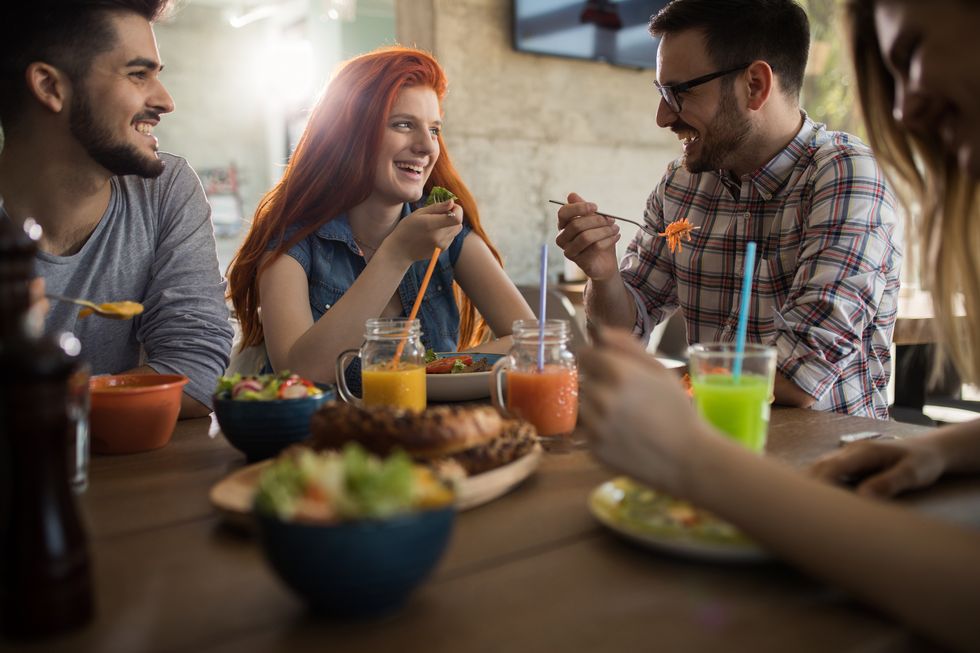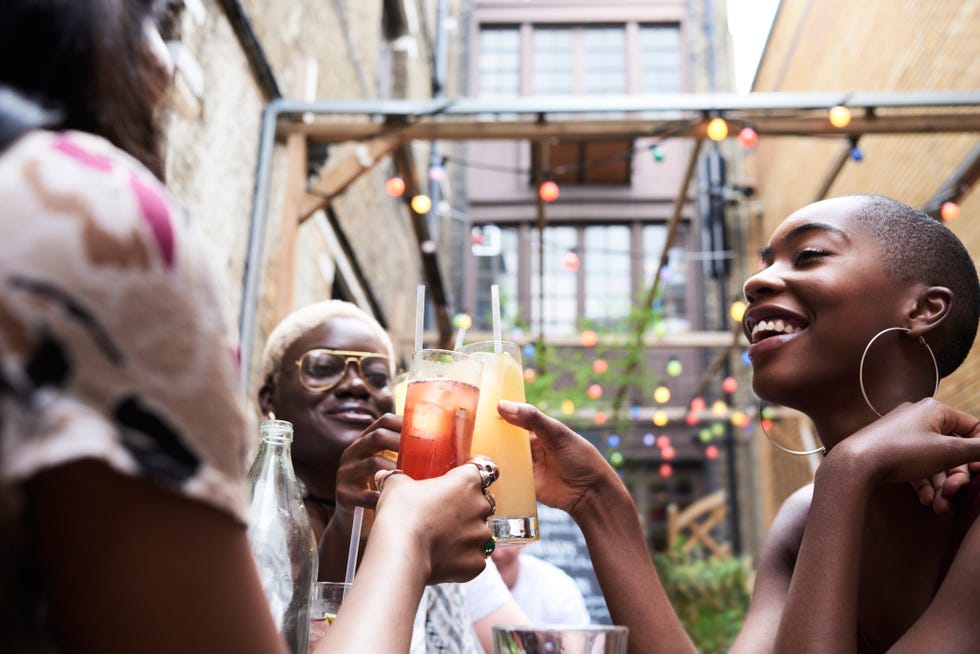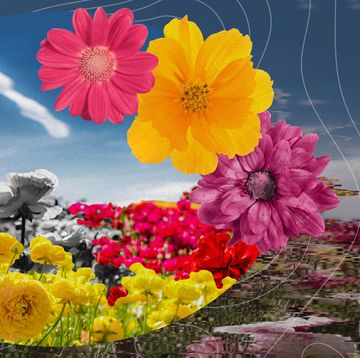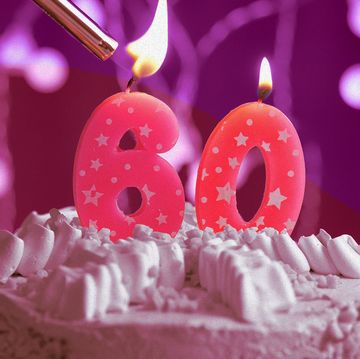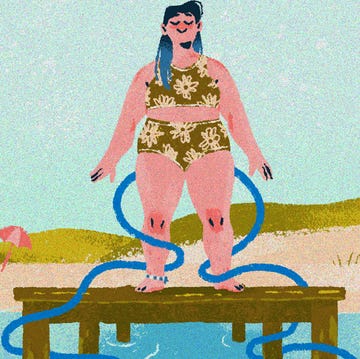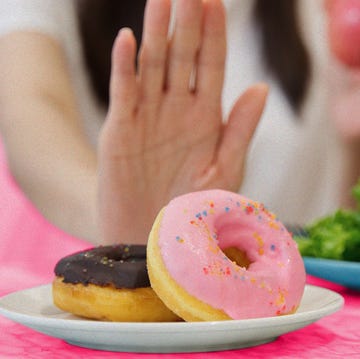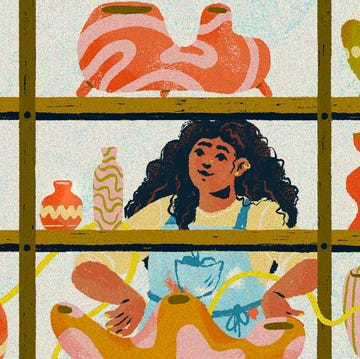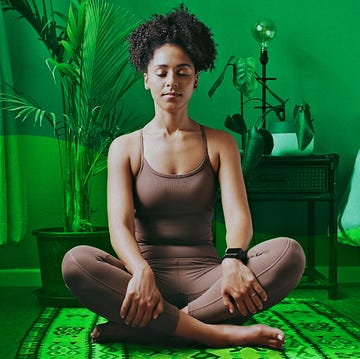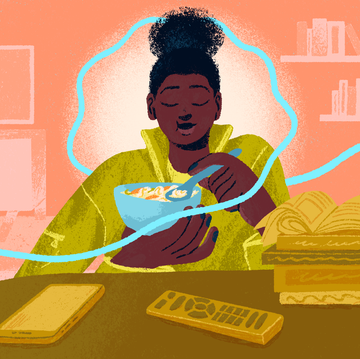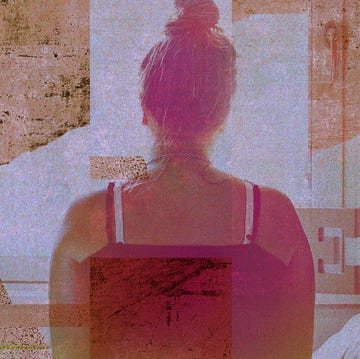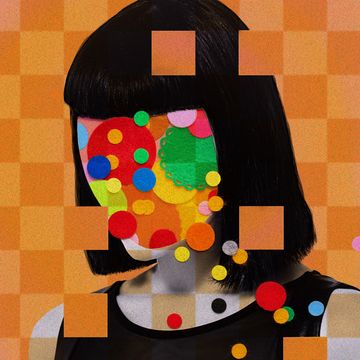In the Shondaland series The Magic of Moving Forward, we’re bringing you forward-thinking stories that illustrate how moving on from something is a way to level up. From women finding joy by throwing themselves divorce parties to vulnerable tales about entering new friendships and relationships, to discovering pleasure in life after giving up a bad habit — there’s no one way to flip the page and find happiness all over again.
For the last six months, I’ve kept an app called I Am Sober on my phone. It’s a sobriety tracking app that, in the last five years, has sprung up among the countless others (like Try Dry, Nomo, and Saying When) that help monitor habitual use of drugs and alcohol or provide access to communities of like-minded people who are in need of or curious about sobriety. I Am Sober runs a timer, tracking how long a user has abstained from any one of a number of intoxicating substances. Alcohol has never been a large part of my life, but over the last few years, both during the pandemic lockdown and then during the excitement of restarting daily activities, I’ve noticed a creep. Airport lounges, meeting up with friends, concerts — they all seem to include a drink. Taking a moment to decide if I want to hit the reset button on my app, thus erasing my “streak” of sobriety, has forced me to also consider if I actually want to indulge. And more often than not, the answer is no.
Reevaluating our relationship with alcohol is tricky because, as anyone who has left the house can attest, it’s everywhere. The default whether you’re at a bar, party, or social engagement is drinking. Many people who abstain are often subjected to personal questions, or perhaps an unspoken assumption that they must be dealing with an addiction.
However, more people are actively deciding to either give up drinking or dramatically curtail their drinking. According to a study by NCSolutions, 34 percent of Americans are aiming to drink less in 2023 — with 93 percent of those surveyed noting that drinking is a big part of American culture. We might not all be addicted. But if, like me, your habit has left you with a headache, a sluggish feeling, or just a desire to spend money elsewhere in your budget, it might be worth reevaluating if alcohol has a place in your life. Or maybe it’s not the center of your social interactions as it once was.
“A habit is often more conscious and purposeful, while an addiction is often driven by unconscious desires and may actually go against someone’s stated purposes,” says Pam Shaffer, a licensed marriage and family psychotherapist and the founder of Best Self Psych. “People can have negative relationships with substances and behaviors even if they aren’t classified as an addiction. If your relationship with a substance or a behavior is interrupting your relationships with other people or getting in the way of your creative or professional goals, it’s a good time to reevaluate the role of that behavior or substance in your life.”
Sober curious
Eight months ago, Helen Boast, a London-based photographer, started to evaluate her relationship with alcohol, and now will often go several months without a glass. She’s never considered herself an alcoholic. But after a few rough nights, including a scare that landed her in urgent care, she was convinced that it was time to cut way back. She quickly discovered that being “sober curious” — where she might have the rare drink with friends or sample an occasional single interesting cocktail instead of regularly choosing to drink — made more sense to her than simply swearing off alcohol altogether.
“I’ve never really felt the pressure to be ‘sober,’” she explains. “I started doing some of the AA online zoom meetings and Al-Anon meetings out of curiosity, and the more I sort of listened to people talk about alcohol, their sort of stories, the more I realized that I don’t think I need to stop completely. It doesn’t have to be that extreme. I can just have a glass of wine with my friends and have a really lovely time, and I don’t have to drink to be drunk.”
Nonalcoholic options
It can be liberating to either decide to give up alcohol or cut way back. And with the ever-expanding market for nonalcoholic beverages, you won’t be left drinking a soda or seltzer while everyone else indulges. Companies like Three Spirit have attempted to replicate the alcohol experience by creating high-end cocktail components, including bubbly wine that forgoes alcohol but uses enough ginger to provide the drinker with a natural lift. Hiyo has created a seltzer that not only contains a garden’s worth of botanicals like ashwagandha, cordyceps mushroom, and lion’s mane, but also comes in a brightly colored celebratory can designed to fit in with anything that might be drunk at a party. And with shops like Soft Spirits in Los Angeles and entire bars such as Hekate Café & Elixir Lounge in New York, you can essentially re-create any part of the alcohol experience without actually drinking.
Know your why
While Shaffer is on board with the idea of swapping out damaging habits for ones that better fit your lifestyle, she has a piece of advice before you reach for that fancy bubbly beverage — namely, know your “why.” Are you quitting to avoid a hangover? Abstaining to be more present in the moment? Not really that interested in alcohol to begin with? Once the novelty of reaching for a new beverage wears off, it’ll be those reasons that will continue to help you modify your drinking habits for long-term success, if that is what you are looking for.
“In order to stop a habit or find a replacement, a person must understand why they are doing that habit in the first place and what purpose it serves so they can find something to take its place,” she notes. “Once you understand why you are engaging with a habit, you can find different things to occupy that space that might suit you better.”
For Hiyo co-founder George Youmans, his sober journey was kicked off by the odd and terrifying coincidence of having a close family member hospitalized with alcohol-related issues in the same month another co-founder was dealing with a similar struggle.
“It was this weird, coincidental, traumatic experience that I think caused us both to start looking into our relationship with alcohol and cutting back significantly,” he says.
“Ultimately, that was the catalyst for Hiyo, going through that experience and trying to drink less. … We were launching Hiyo, and I think at one point, I had one pretty bad hangover, and I just said, ‘You know what? I think I’m good here.’ I just feel like I’m better without it. It didn’t really serve me. But it was definitely challenging. I think for a lot of people, alcohol is a big component of their life, and maybe it’s a bigger component than they even really recognize until they start to try to mitigate it or remove it entirely,” Youmans says.
Abundance mindset: What are you making space for?
The most important thing, says Youmans, was that his journey to sobriety wasn’t marked with self-judgment but rather curiosity, something that he’s trying to pass on to Hiyo customers. How can you frame choosing to drink as something other than missing out?
“I think the concept around sobriety is [that] a lot of people focus on what you’re taking out,” he says. “You’re taking out alcohol, then that means that you’re going to take out fun, and you’re going to take out community, and you’re going to take out, like, crazy wildness, right? And that is an experience that people are then going to find themselves on the spectrum of how big of a part alcohol plays in your current life. But then when you do take that out, it’s like, all right, what are you making space for?”
Dating sans booze
For many people, navigating their love life in regard to alcohol can be a minefield. But as Gigi Engle, an Approved Clinical Supervisor-certified sex educator and lead intimacy expert at 3Fun, notes, it doesn’t have to be. As she points out, honesty will get you a long way, particularly if you explain your situation to a date before you meet. Also, having a few fun activities where drinking isn’t the focus will keep you focused on making a connection instead of taking a drink.
“If you’re doing an activity like mini golfing, seeing a movie, going to a farmers market, you’re not constantly having alcohol in your face,” Engle says. “You have something to do so you’re not thinking about drinking. If you do go to a bar, I suggest an arcade bar. You’re playing Skee-Ball or basketball, and the activity can help you feel stimulated without the need for alcohol.”
It was a mindset of abundance that Boast discovered while learning how to date while sober. Often, she was blocked by men who found non-drinking to be a deal-breaker, something she initially found disappointing. But the resulting dates she did have, either at coffee shops or bars where she’d have a Diet Coke, proved to be better connections for her. That positive reinforcement proved to be the inspiration she needed to continue her sober-curious journey.
“It definitely weeded out a few characters that I didn’t want to go on dates with anyway,” she laughs. “And then, the people who were interested would say, ‘Oh, that’s great!’ I just sort of realized at that point I don’t have to drink anymore. I can go into circumstances and say, ‘I’m not going to drink, or I can choose to simply have just one.’”
Laura Studarus is a Los Angeles-based travel writer who has contributed to Fast Company, BBC Travel, and Thrillist. Follow her on Twitter at @Laura_Studarus.
Get Shondaland directly in your inbox: SUBSCRIBE TODAY

